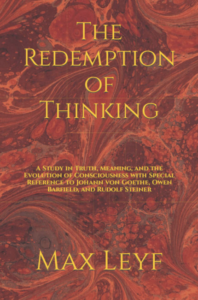13 Feb The Redemption of Thinking: An Interview by Tim Nadelle with the author Dr. Max Leyf
A Study in Truth, Meaning & the Evolution of Consciousness, with Special Reference to Johann von Goethe, Owen Barfield and Rudolf Steiner
Here is the introduction:
If you love the Philosophy of Spiritual Activity, I heartily recommend you order (and read!) a copy of Max Leyf’s book, The Redemption of Thinking, published in 2020. I had the pleasure of interviewing Max during the Holy Nights of 2021-2022. (I provide a brief biography of Dr. Max Leyf below, at the end of the interview.)
The book, which was Max’s PhD thesis, unfolds in 4 sections, as follows:
i. The hard problem of consciousness
ii. The open secret: Goethe’s way of knowledge
iii. Barfield and the evolution of consciousness
iv. “Quid est Veritas” What is truth?
This is an important book, a book which reencounters many of the living ideas of the Philosophy of Spiritual Activity and the Riddles of Philosophy through a journey into the evolution of modern science. I feel, in a way, that Max has taken up the task of writing this telescopic book on behalf of all of us who love Anthroposophia and would see her take her rightful place of spiritual leadership among the great minds and transformative impulses of the day.
With adroit intellectual seacraft, Max navigates the scientific and philosophical writings of Bacon, Galileo, Descartes, Newton, Kant, Darwin and many other stormy waters. Plato, Aristotle, Aquinas, Goethe and Barfield provide the wind in his sails throughout; and he sweeps into port with Rudolf Steiner, which arrival, of course, signifies the commencement of a new journey.
Max goes on to provide a map for that new journey in Appendix D: Phenomenology of the Soul and the Transfiguration of Consciousness.
I was also able to watch and listen to a Zoom recording of Max’s defense of his dissertation. Here are comments on Max’s dissertation from several committee members from the California Institute of Integral Studies, who asked questions during the recording. Bear in mind these are not anthroposophists; they are simply contemporary thinkers, all PhDs, who were tasked with evaluating Max’s achievement.
“… an extraordinary work of genuine vision; also a work of erudition, of learning…” [Richard Tarnas]
“… a work of healing as well as a theoretical, analytical work…” [Matt Segall]
“… The insight that there’s a deep connection to the recovery of participatory knowing, not just theoretically but in an active fashion, as a way of response to the meaning crisis – I think that’s brilliant.” [John Vervaeke]
Oh and, by the way, as a kind of bonus for those who purchase the book, in Appendix B, Max provides his own translation of Rudolf Steiner’s Calendar of the Soul. Here is a link you can use to order Max’s book:
